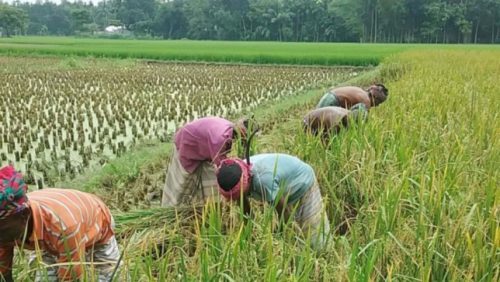The Minister of Agriculture and Rural Development, Sabo Nanono, has said that with the phenomenal increase in rice production and processing in the country, Nigeria will be exporting the commodity in the next two years.
The minister stated this on Thursday in Kura, Kano state during an assessment tour of the impact of the border drill on the entire rice production value chain.
Nanono, Minister of Information and Culture, Alhaji Lai Mohammed led stakeholders and a team of journalists on inspection of a cluster of cottage rice mills in Kura.
The team also visited four integrated rice mills in the state, which are Al-Hamsad Rice, Kura Brothers Rice Mill, Tiamin Rice Ltd and Umza International Farms.
“The way and manner we are going in the production of rice, in the next two years, we will start exporting rice outside the country.
“For those that are worried about the partial close of our borders, we are not doing this to hurt the people but to protect the future of the country, provide jobs and food sufficiency.
“Government will continue to give support to rice farmers to achieve this goal,” he said.
The minister said that Kura is an agrarian settlement known for irrigation farming in rice, tomato, maize and other items, mostly consumed in the Southern part of the country.
He said farmers in Kura had, however, concentrated on rice production following the border drill and the ban in rice importation.
Speaking in the same vein, Mohammed assured that the federal government would continue to support the stakeholder in the rice production value chain.
He, however, appealed to rice growers and millers not to see the loans given to them as their own “share of the national cake”.
“They must understand that when loans are not paid back, it will be difficult for them and others to get more loans,” he said.
The Chairman Kura Rice Processing and Marketing Association, Sabo Nanono, called on the government to sustain the border closure, stressing that Nigeria has the capacity to feed itself and the neighbouring countries.
Idris, who spoke in Hausa language, said since the closure of the borders and the commitment of President Muhammadu Buhari to achieving self-sufficiency on food production, his people were fully back in business.
He disclosed that over 10,000 youths in Kura Local Government were gainfully employed in the rice production value chain and they produce about 5000 tones of rice every day.
He commended the Federal government for supporting them with modern machine and urged provision of polishers, de-stoners to further enhance their production.
The President of Integrated Rice Millers Association in the state, Mohammed Umza, said the border closure had impacted positively on rice industry nationwide and in particular, Kano state.
He said prior to the closure, the industry had been battling with foreign rice market forces, which threatened its coexistence.
Umza said that the border closure had helped to transform the rice value chain in Kano State.
Copyright Ships & Ports Ltd. Permission to use quotations from this article is granted subject to appropriate credit given to www.shipsandports.com.ng as the source.

